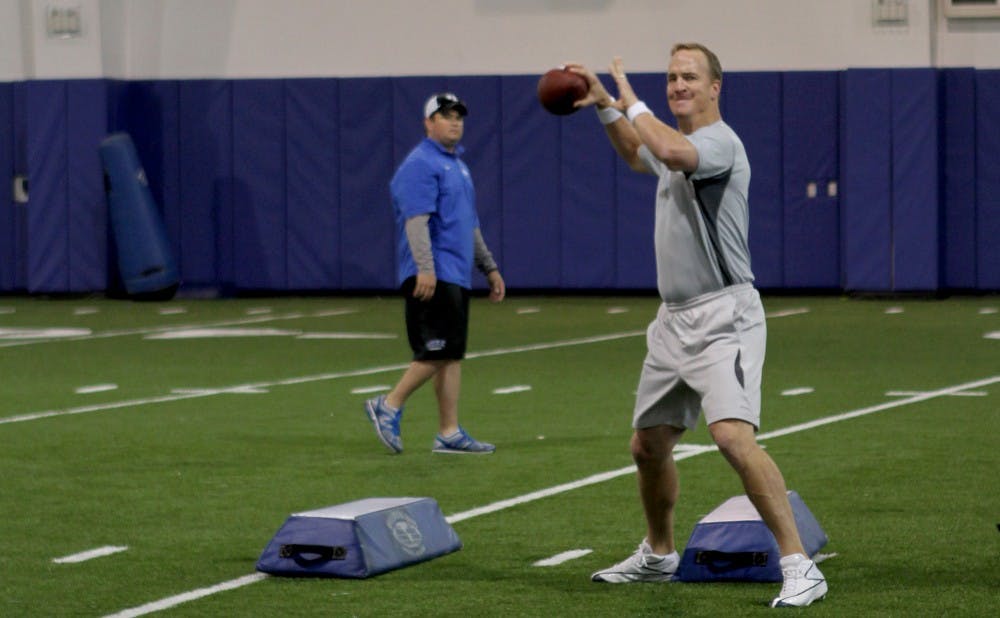These days, it feels like being a woman and being an NFL fan are mutually exclusive.
As I’ve matured from the little girl who anxiously watched her hometown Carolina Panthers battle on the gridiron week-to-week to a more conscientious fan, I have come to the realization that my sports heroes are not without flaws.
Hamartia is Aristotle’s concept of the protagonist’s fatal flaw that ultimately leads to their downfall.
Let’s take the past few weeks as an example. First, Peyton Manning—five-time league MVP and all-American quarterback—was accused of using the banned substance human growth hormone by now-defunct Al Jazeera. Then, not-so-golden boy Johnny “Football” Manziel was accused in an affidavit of rupturing the eardrum of ex-girlfriend Colleen Crowley, causing her to lose hearing in one ear. Although, if "Money Manziel" was one of your sports heroes to begin with, you should probably re-evaluate your judgment.
But wait, there’s more! Cam Newton sulked at a press conference after losing the Super Bowl—because apparently this was a big deal somehow. Just when I thought the narrative of Newton as spoiled or a thug would be the major post-Super Bowl story, New York Daily News reporter Shaun King revisited an old case of sexual assault involving Manning during his college career at Tennessee.
Seriously? This is exhausting. Forget the sulking, forget the HGH. In the past month, two professional quarterbacks have been in the news for committing acts harmful to women. How can a female Broncos fan relish the joy and emotions of seeing her team reach the pinnacle of professional football when their highest-profile star smeared the name of the woman he was accused of sexually assaulting?
Maybe Manziel and Manning are anomalies. In fact, NFL players have lower arrest rates than the average male aged 25 to 29. But according to data from 2014, domestic violence arrests was the category where NFL players fared the worst, recording an arrest percentage that was 55.4 percent of the national average.
Since 2000, 92 NFL players have been arrested for domestic violence. That number does not include other cases of sexual assault—of which 68 percent of cases go unreported—or the other half of domestic violence cases that are believed to go unreported.
Let me be clear. The vast majority of professional football players in the league’s 32 franchises are exemplary citizens. The annual Walter Payton NFL Man of the Year Award attests to that. This year’s recipient, San Francisco 49ers wide receiver Anquan Boldin, has testified at the White House for Senegalese rights, served as an Oxfam Ambassador and started his own foundation that provides enrichment, education and food to underprivileged youth and communities.
He’s not alone. New Orleans Saints tight end Benjamin Watson is a spokesman for the All Pro Dad Campaign. Seattle Seahawks cornerback Richard Sherman hosts a celebrity softball game every year to support Blanket Coverage—the Richard Sherman Family Foundation. The list goes on and on.
For every fallen hero, there are countless men of character making a difference. Yet, when such mistreatment of women does occur with shockingly high frequencies, it makes it harder to reconcile the game we love with the actions of its players.
I do not have an easy answer for the Browns or Broncos fans. How do you balance the thrill of taking in a live game at Mile High Stadium with the fact that the man fielding the snap may not be the hero you once held in esteem?
But, there is hope. The recent move I have appreciated the most from the NFL was the extension of the Rooney Rule to include women when hiring for NFL executive positions. I have to imagine having more women in positions of weight in the league can only be a great thing for the female fan. When more women have a place at the table, perhaps we will see policy and culture changes.
As I struggle with re-evaluating my heroes on the field, perhaps now I can look into the boardroom to find my protagonist.
Get The Chronicle straight to your inbox
Sign up for our weekly newsletter. Cancel at any time.

